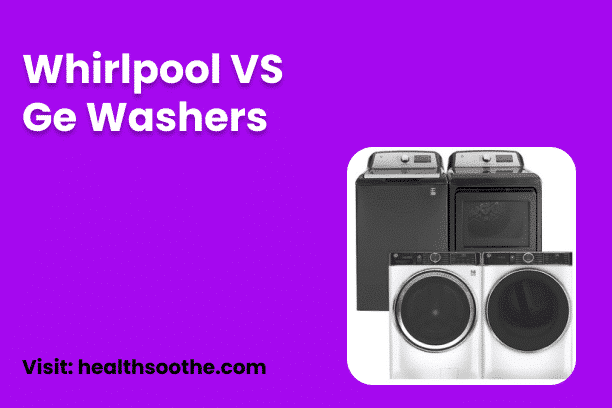General Electric (GE) and Whirlpool Corporation have a history dating back over a century. Therefore, it’s not surprising that they rank among the most popular washer brands, sparking the ongoing debate between GE and Whirlpool washing machines.
GE washing machines are known for their modern, advanced features, affordability, reliability, spaciousness, speed, and smart capabilities. Conversely, Whirlpool washing machines have a more minimalist design, offer a wider range of wash cycles, feature user-friendly controls, and boast larger auto dispensers.
In essence, you can differentiate between GE and Whirlpool washers based on their appearance, dependability, price, variety of cycles, auto dispenser size, capacity, user-friendliness, spin speed, and intelligent functions.
About GE
General Electric, commonly referred to as GE, is a United States-based company headquartered in Boston, Massachusetts. It was founded in 1892 by notable individuals such as Charles Coffin, JP Morgan, and Thomas Edison.
GE is a versatile conglomerate that manufactures products for a wide range of industries, including energy, healthcare, aviation, power, software, and aviation.
In the washing machine sector, GE offers a diverse selection of washers, including top-load washers, front-load washers, portable washers, stackable washers, and laundry centres. These washing machines are known for their affordability, with top-loaders starting at $512 and front-loaders at $779. Additionally, they are spacious, with some models boasting a capacity of up to 5.4 cubic feet.
One of GE’s standout features in its washing machines is Smart HQ, which enables users to receive real-time notifications and control the washer remotely via a smartphone.
About Whirlpool
Whirlpool Corporation is another prominent appliance manufacturer based in the United States. The company’s origins trace back to its founding in 1911 by Envoy Upton and Louis Upton, with its headquarters located in Benton Harbor, Michigan.
Whirlpool is renowned for producing a wide range of household appliances, including washers, dryers, dishwashers, ovens, freezers, refrigerators, water filters, and cooktops, among many others.
In the washing machine sector, Whirlpool offers a diverse lineup of appliances, including top-loaders, front-loaders, stackable washers, laundry centres, and all-in-one washers. This variety is similar to that offered by GE.
In terms of pricing, Whirlpool’s top-loading washing machines start at $579, while front-loading models begin at $749. While Whirlpool may not be considered the most innovative manufacturer, it is widely recognized for producing user-friendly and reliable washers.
Whirlpool Washing Machine vs. GE Washing Machine Differences
- Price:
- GE: GE washing machines are generally known for their affordability, with top-loaders starting at $512 and front-loaders at $779.
- Whirlpool: Whirlpool’s top-loading washing machines start at $579 while front-loading models begin at $749.
- Innovation:
- GE: GE washing machines are often considered more innovative, featuring technologies like Smart HQ, which allows for real-time notifications and remote control via a smartphone.
- Whirlpool: While not as focused on innovation, Whirlpool is known for producing reliable and user-friendly washers.
- Appearance:
- GE: GE washing machines tend to have a modern and stylish appearance, appealing to those who prioritize aesthetics.
- Whirlpool: Whirlpool washers may have a more minimalist design.
- Capacity:
- GE: Some GE models offer generous drum sizes, with capacities of up to 5.4 cubic feet, providing ample space for larger loads.
- Whirlpool: Whirlpool washers also come in various sizes, but specific capacities may vary by model.
- Features:
- GE: GE washing machines often come with rich, smart features, making laundry tasks more convenient.
- Whirlpool: Whirlpool models offer a variety of wash cycles and user-friendly controls, prioritizing functionality.
- Reliability:
- GE: GE washers are generally considered reliable, but specific models may vary in terms of durability.
- Whirlpool: Whirlpool is known for producing washers that are reliable and dependable over time.
- Ease of Use:
- GE: GE washing machines may offer advanced features, but they are designed to be user-friendly, with intuitive interfaces.
- Whirlpool: Whirlpool washers are also designed with user-friendliness in mind, making them easy to operate.
- Wash Cycles:
- GE: GE washers offer a variety of wash cycles to suit different laundry needs.
- Whirlpool: Whirlpool washers also provide a range of wash cycles, ensuring versatility.
- Auto Dispensers:
- GE: The size and functionality of auto dispensers in GE washers may vary by model.
- Whirlpool: Whirlpool models may come equipped with auto dispensers designed for convenience.
- Spin Speed:
- GE: GE washers may offer varying spin speeds, affecting the efficiency of water extraction during the spin cycle.
- Whirlpool: Whirlpool washers also provide different spin speed options.
Pros and Cons of whirlpool vs ge washers
Whirlpool Washers
Pros
- Variety of Wash Cycles
- Intuitive Controls
- Detergent Dispenser
- Reliability
- Energy Efficiency
Cons
- Price
- Capacity
GE Washers
Pros
- Affordability
- Capacity
- High RPM
- Color Choices
- Innovative Features
Cons
- Fewer Wash Cycles
- Controls
- Detergent Dispenser
Differences Between Whirlpool and Maytag Washers
Whirlpool Washers
Whirlpool washers often emphasize innovation, a wide range of features, and modern design. They focus on offering advanced technology and convenience.
Maytag washers have traditionally been associated with durability and reliability, with a reputation for being built to last and requiring fewer repairs.
Alternative to whirlpool Washer
Electrolux
Electrolux manufactures high-quality front-load and top-load washing machines with advanced features like SmartBoost technology, which premixes detergent with water for more effective cleaning.
Similarities between GE and Whirlpool Washing Machines
- Odor and Mold Prevention Technology:
- Both brands offer a Sanitize Cycle, eliminating up to 99% of household bacteria, and ensuring a hygienic wash.
- GE has its Ultra-Fresh Vent System, and Whirlpool offers Tumble Fresh technology to keep your clothes fresh and prevent mildew odours.
- Energy Efficiency:
- Both Whirlpool and GE prioritize energy efficiency in their washing machines, holding energy ratings and qualifications that help reduce energy consumption and lower utility bills.
- Auto-Dispensers:
- Both brands feature auto dispensers that smoothly release detergents during the wash cycle, preventing overfill and ensuring optimal detergent distribution.
- Steam Cycles and Pre-Soak:
- Whirlpool and GE offer steam cycles, allowing for the effective removal of tough stains.
- Both brands provide a pre-soak option, enabling users to pretreat clothes before the main wash, improving stain removal.
- Multiple Wash Cycles:
- Both Whirlpool and GE washing machines come equipped with a wide selection of wash cycles, providing users with the flexibility to cater to various laundry needs.
- Washer Types:
- Whirlpool and GE offer a diverse range of washer types, including top-load, front-load, portable, and stackable models, allowing customers to choose based on their space and usage requirements.
GE vs. Whirlpool Front Load Washer
GE and Whirlpool front-loading washing machines exhibit distinctions mainly in terms of pricing, the variety of wash cycles, drum capacity, revolutions per minute (RPM), automatic detergent dispensing, and user-friendliness. Whirlpool front loaders offer a greater number of wash cycle options, the convenience of a larger automatic detergent dispenser, and more intuitive control interfaces.
In contrast, GE front loaders feature slightly larger washing capacities, come at a more budget-friendly price point, possess higher RPMs for enhanced water extraction during the spin cycle, and offer a selection of colour options. Both choices, however, prioritize water efficiency, offer stackable configurations, and are known for their reliability.
GE vs. Whirlpool Top Load Washer
Although both GE and Whirlpool top-loading washing machines require minimal maintenance and offer quicker washing, they exhibit slight variations in terms of capacity, pricing, the array of wash cycles, and user-friendliness.
GE takes the lead in terms of capacity and affordability, as its top-loading washers are a bit roomier and come at a lower cost. Conversely, Whirlpool excels in user-friendliness and the variety of wash cycles available, boasting more intuitive controls and a wider range of cycle options. These advantages offset the slightly higher price of Whirlpool models.
Conclusion
In conclusion, the choice between Whirlpool and GE washers ultimately comes down to your individual preferences, priorities, and specific laundry needs. Both brands offer a wide range of washing machines with their own unique features and advantages.
Whirlpool is known for its extensive selection of wash cycles, intuitive controls, and reputation for reliability. The brand often places an emphasis on user-friendliness and convenience, making it a solid choice for those who value ease of operation and a wide variety of cycle options.
On the other hand, GE washers offer affordability, slightly larger capacities, and innovative features like Smart HQ for remote operation. They also provide a range of colour options, catering to those who seek customization and advanced technology.
Whether you prioritize the number of wash cycles, capacity, price, energy efficiency, or additional features like auto dispensers and RPM, both Whirlpool and GE have options to suit various preferences and budgets.







